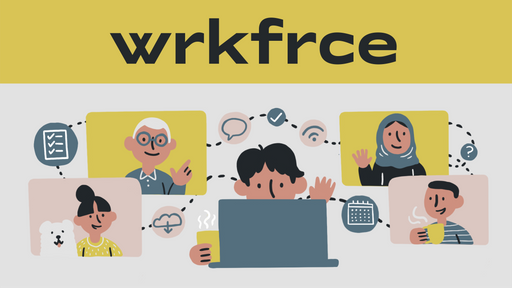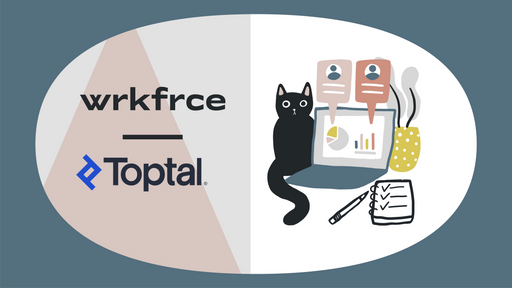wrkfrce Playbook Project: How to Create a Strong Remote Culture
by Sarah Archer

To complement our summaries of playbooks by leading remote-first companies, digital nomad Sarah Archer has put together a three-part thematic series covering everything current—and aspiring—remote businesses need to know about how to hire the best employees, collaborate with a team, and build a rock-solid company culture for even the most distributed of staff.
A company’s culture is what sets it apart from its competitors. A strong culture can lead to higher productivity, higher retention, and happier employees. When your company is running remotely, it’s even more important to home in on a culture that supports your staff during and outside work.
After spending hours reading top remote company playbooks from front to back and tapping experts in the world of remote work, we identified the following as the best practices for creating a strong remote culture.
Set the Stage for a Strong Remote Culture
A strong culture leads to impressive outcomes. But how do you foster that? It starts with leadership.
Your leadership team should devise and document a remote work policy, including a chapter that defines your company’s culture. Your company’s purpose and strategy should be clear, as well as how you support employees to reach their work and life achievements.
Explain how your team builds trust and camaraderie, as well as how you work together. And while drafting your remote work policy, consider why someone would want to work at your company. Does your culture make your company a compelling place to work? Prospective employees will read about it in online reviews and sense it in interviews, so it’s important to create up front a work environment that people simply want to be in.
Build Camaraderie and Trust
Building camaraderie takes time, but it’s possible by constantly showing that you care about your employees, not just their work.
First, invest time in your people by always starting meetings by asking participants how they’re doing. Talk about any weekend adventures they went on, recent Netflix shows they watched, or local happenings in their community. Building camaraderie involves building friendships, so always work on your relationships before diving into work talk.
Go even further by creating meetings and groups dedicated to relationship building virtually: Launch a virtual book club; hold work space tours that allow employees to share their favorite room in their homes; and create hobby-related Slack channels that encourage people to chat about common interests like cooking, exercising, or traveling.
And once it’s safe to do so postpandemic, remember that remote teams can meet in person too. Encourage meet-ups for employees who live close to each other by paying for their lunch together, and host fully paid annual retreats where you can engage in deeper conversations and have fun as an entire team.
Show That You Care
Show empathy toward your employees by being proactive about mental health. Realize that it’s easy for mental health issues to arise and go unnoticed in a remote setting, so show your support by compensating for professional counseling, offering mental health days, and providing training management in mental health.
Self-care is just as important to help employees avoid feeling overworked. Offer self-care days that allow employees to spend time with their family or on their hobbies. Finally, don’t celebrate long hours. Advocate for employees to take breaks throughout the workday, and push them to mute notifications once they sign off. A healthy work-life balance is crucial in developing a workplace where people genuinely enjoy spending time.
Recognize People and Celebrate Wins
Don’t let employee achievements go unnoticed. Create a committee that keeps track of all employee birthdays, work anniversaries, and personal milestones, such as graduating from a part-time master’s degree or certification program.
Give employees in such situations a shout-out using Officevibe, Kudos, or Slack so their colleagues can recognize them. And reward them with a surprise, such as a virtual gift card or a personalized physical gift that you send to their home.
Launch a Mentorship Program
Help your employees work toward their career goals by setting up a mentorship program. Mentors are there as point people who can provide advice on career growth, share tips, and just chat about life outside work.
Sometimes it’s hard to break free from connecting solely with your team when you work remotely, but launching programs that pair employees from different divisions of your company will improve cross-departmental communication.
Give Your People the Freedom to Make Decisions
There’s nothing worse than constantly worrying about the choices you make at work. Will your boss get angry over an email you sent? Will your team turn against you for leading a project in a different direction?
Alleviate that fear from your team and ensure psychological safety by putting trust in your employees. Give them the freedom to make decisions that they can grow and learn from. This type of freedom expedites projects, as no one needs to wait from upper management to make a decision. And if someone makes a mistake, treat it as a learning opportunity that will help them make an even better decision next time.
Promote Diversity and Inclusion
Promoting a diverse and inclusive environment doesn’t stop at hiring. Learn from the perspectives of those from different backgrounds to create a better, more inclusive culture.
Make sure that the language and design used across your company, both internally and externally, are purposeful and diverse. And be transparent with everyone about what you’re not doing well enough and need to improve on. Regularly survey staff to learn about what you can improve on, and don’t hesitate to apply those lessons.
Be Transparent About Everything
A major part of creating a successful remote culture is making sure that everyone feels like they’re on an equal playing field. You can do that by publicly sharing objectives and key results with the entire company. That way, you’re directly illustrating the importance of transparency.
The same goes for making information accessible to everyone. Document all decisions in one central place, like a project management platform or on the cloud. All recorded meetings, notes, and road maps should live in that one public hub and should be updated in real time.
Beyond that, be transparent about how employees should work. Define how they communicate internally and to customers, how many hours they should work, and what your company considers quality work.
Also realize that nothing in your policy is set in stone. While leadership paves the way for a strong remote culture, your employees are what support and evolve it. You should always ensure that your company has opportunities to update its remote policy, based on employee feedback. You can use feedback software like Culture Amp or TINYpulse to gather input from the entire organization.
Provide the Means for a Great Culture
Empower your staff to create a remote work space, grow their career, and build relationships in your industry with financial support.
Offer a budget for their hardware and home-office setup, such as a laptop stand, an external keyboard and mouse, a second monitor, a stand-up desk, soundproof headphones, an ergonomic chair, a microphone, and a camera. To go one step further, cover their bills for high-speed internet and phone.
Not only will these gestures ensure that employees feel comfortable enough to produce their best work, but they will help keep work and play separate. It’s easy for lines to become blurred in a remote setting, but if employees have a separate work-only zone, they can avoid answering emails during off-hours.
Additionally, provide your employees with an annual stipend for courses or certification programs in their field. And offer a coworking-space stipend so they can network with people in their community. Alleviating the financial burden that comes with working remotely will help your employees feel more connected to your company and to their colleagues.
When you’re building your company culture, know that it will constantly evolve to fit the needs and support your staff. The trick is to establish as solid a foundation as possible and then to continue building upon it year after year.









